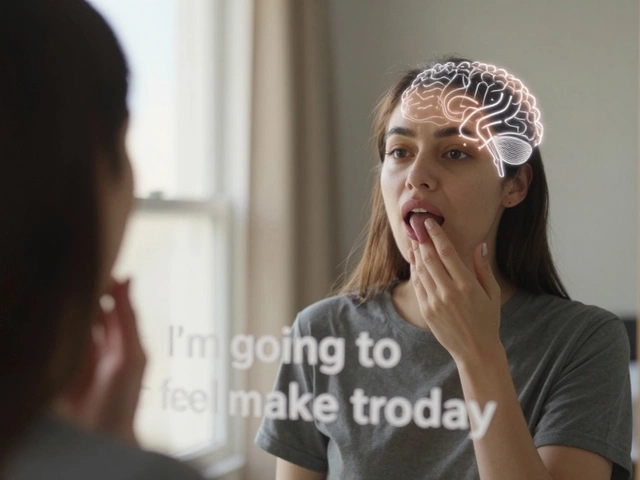Want to level up your English skills but dread boring textbooks? Try swapping those grammar drills for a night of binge-watching some killer TV shows. Not only can TV series actually help you sound more natural, but they drop you right into the rhythm, slang, and culture of real, living English. Crazy, right? Imagine picking up jokes, idioms, and sarcasm while chilling on your couch with Max (well, in my case, a Golden Retriever who really prefers cartoons). People who watch TV in a foreign language are way more likely to understand different accents, speed of speech, and even emotional tones, compared to those glued to drill apps. The U.S. Department of Education once even released a report showing language learners who watched at least five hours of subtitled series every week outperformed those who didn’t by 20% in listening and speaking tests. Wild what a little Netflix can do.
Why TV Series Are the Ultimate English Teachers
You might wonder, why not just stick to language apps? Well, language is messy in real life. Apps won’t teach you how people actually debate about pineapple pizza, flirt, or complain about traffic. TV shows throw you into that natural chaos. In fact, the BBC found that students who made TV viewing part of their English routine not only improved their vocabulary, but scored higher on pronunciation and comprehension—sometimes by as much as two grade levels in a six-month period.
Here’s the deal. TV shows serve real-life English, complete with slang, humor, regional accents, and cultural quirks. No teacher can replicate that. You get to hear different ways people greet each other, tell jokes, fight, apologize—stuff you’ll never find in a textbook. Even gestures and body language help. There’s a reason schools in Europe encourage binge-watching English series—the students pick up intonation, hesitation, and even sarcasm, which are notoriously hard to master elsewhere.
Using subtitles can also make a big difference. When you get stuck, turn on English subtitles for an episode. This trick actually helps connect what you hear to how words look, boosting your memory. But don’t overdo subtitles in your own language—stick to English subtitles as much as you can.
Plus, you can pick a show that fits both your taste and your English level. Love soap operas? “Friends” or “How I Met Your Mother” was basically designed to help non-natives learn American sarcasm and small talk. Into action and British wit? “Sherlock” combines clever dialogue with plot twists that keep you pressing ‘next episode.’
How about an example? My cousin from Brazil learned her killer British accent from “Peaky Blinders.” She started mimicking Tommy Shelby’s intimidating lines to her boss (which, okay, might be risky unless your boss has a good sense of humor). But she could suddenly switch between formal and street style as needed. That’s valuable in the office... or at the bar. Watching TV series sharpens your ears to differences between casual and formal language—stuff that’s tricky to pick out in a classroom. You learn when to say “What’s up?” vs. “How do you do?”
Looking at actual numbers, a 2022 survey by the Cambridge English group found that out of 3,000 language learners, nearly 60% credited subtitle-rich TV shows as the fastest way they improved their conversational skills. Want an extra boost? Try replaying short, funny scenes several times. Then try saying the lines out loud, with the same accent and tone. It’s way less embarrassing than doing it in public, and it works.

Top TV Series To Sharpen Your English—And Why They Work
Picking the right show matters. Some TV series use clear, everyday language. Others are full of regional slang or complicated storylines. Here’s a breakdown of the best shows for English learners at different levels, each with its own strengths—and quirks.
- Friends: Still the gold standard for English learners. The language is easy and every episode tackles daily-life topics. Rachel and Joey’s arguments about pizza and dating are as close as you’ll get to a real New York hangout. A lot of English teachers actually assign “Friends” episodes as homework. Fun fact: people who study with “Friends” often report they feel less afraid to speak in casual situations, since the jokes and catchphrases stick.
- Stranger Things: Everything in this mega-hit is pure American middle-school banter. You’ll catch expressions teenagers use (sometimes a little too ‘80s), plus some horror lingo. It’s great for pushing your comprehension speed, since the kids talk fast and switch between panic and joking in seconds.
- The Office (U.S. version): If you want to learn polite work English—and savage workplace sarcasm—this is your show. You’ll pick up business buzzwords, how to chit-chat before meetings, and what ‘It's not my job’ really means in an office setting. There’s an awkward pause for every situation!
- Sherlock: The British version (with Benedict Cumberbatch) is perfect if you like more sophisticated vocabulary and British accents. But be ready: Sherlock speaks at a million miles an hour. It’s excellent for training your listening and note-taking skills. Plus, British humor is in a league of its own.
- Brooklyn Nine-Nine: Perfect for modern slang, cop show clichés, and ridiculous metaphors. This one’s super easy to follow and the jokes land even if you miss some words. The quick one-liners teach you how real people banter at rapid-fire speed.
- Modern Family: You’ll hear American English in many different accents and situations, from a Colombian stepmom’s misunderstandings to teenagers’ texting lingo. It’s a good series for practicing listening to different forms of U.S. English and following conversation flow among families.
- Peaky Blinders: For those who want to try something tougher, this has thick Birmingham accents and old-school gangster slang. Not the easiest, but once you get into it, you’ll brag about understanding some of the hardest British dialects.
- Big Bang Theory: Packed with nerdy jokes and scientific vocabulary, but the humor is light and dialogues are crisp. If you want to understand Americans with weird hobbies, this is your show.
Now, let me tell you, most learners start with “Friends” or “Modern Family”—and for good reason. They’re filled with topics you’ll use every day: dating, work, misunderstandings, and the endless debate about what counts as pizza (seriously, Max, pepperoni is not for dogs). Want a challenge? Jump to “Sherlock” or “Peaky Blinders.” Don’t be afraid to pause and replay lines. Those confusing scenes are gold for picking up how people really connect words, skip syllables, or use “ummm” when thinking.
Netflix, Amazon Prime, and other platforms even have built-in features for language learning now. Netflix’s Language Learning plugin lets you freeze subtitles, look up words, and even quiz yourself after scenes. In a 2023 poll by Pearson, 44% of learners said these tech tricks are what made them stick with daily practice.
Take a peek at how these shows stack up when it comes to variety, speed, and accent in a handy table:
| TV Series | Accent | Level | Vocabulary | Average Speed |
|---|---|---|---|---|
| Friends | American | Beginner/Intermediate | Everyday | Slow-Medium |
| Stranger Things | American (80s) | Intermediate | Youth/Slang | Medium-Fast |
| The Office (US) | American | Intermediate | Business/Work | Medium |
| Sherlock | British | Advanced | Complex/Sophisticated | Fast |
| Brooklyn Nine-Nine | American | Intermediate | Slang/Cop | Fast |
| Modern Family | Mixed American | Beginner/Intermediate | Family/Multi-accent | Medium |
| Peaky Blinders | British (Birmingham) | Advanced | Accent/Slang | Medium |
| Big Bang Theory | American | Intermediate | Technical/Nerdy | Fast |

Tips to Maximize Learning from English TV Series
Binge-watching feels great, but your English improves a ton faster if you use a few smart tricks. Here’s how you make TV your very own language coach:
- Start with English subtitles, not your native tongue. The first few episodes might feel challenging, but you get used to it fast. Seeing words as you hear them helps your brain connect sound and spelling.
- Watch each episode twice. The first run, just enjoy it. On the second run, pause after tricky scenes. Rewind, mimic lines aloud, and see if you can match the actor’s accent or emotion. It’s awkward at first, but nobody’s judging (except maybe Max, who likes anything with barking involved).
- Jot down new phrases in a notebook or in your phone. Instead of writing entire boring sentences, focus on cool expressions, jokes, or slang. Try using at least one or two the next time you chat online with a native speaker.
- Pick a show that matches your interests. If you don’t enjoy it, you won’t stick with it. Into cooking? Try “Chef’s Table.” Sci-fi geek? Can’t go wrong with “Black Mirror.” The more you look forward to the story, the more your brain pays attention without effort.
- Join an online fan community for your show. Reddit, Facebook groups, and language learning apps all have spaces where people discuss episodes. Toss out your opinion in English—you’ll practice writing, get vocab tips, and make new friends.
- Take breaks between episodes to repeat fast dialogues or tricky scenes. This cements new words before you forget them.
- Switch off subtitles after you feel confident. Even if you miss some words, you’ll build real listening skills and not become reliant on reading.
- Mix genres. Watch one sitcom, one drama, one science or documentary series. Your vocabulary gets broader and you train your brain to deal with different speaking speeds and vocabulary sets.
If you’re worried about getting stuck, don’t be. I used to help a friend from Turkey who hated even thinking about English—until we started a “Friends” marathon. Now she regularly cracks Chandler Bing jokes in meetings, which is the true sign of language domination. Bonus tip: Watch TV while doing something chill, like folding laundry, cooking, or even throwing Max his squeaky toy. Your ears get used to English as a background language, which is exactly how native kids learn.
Don’t wait until you ‘feel ready’ to understand everything. Plunge into those series, get lost in weird accents, and laugh when you realize you finally get a joke you used to miss. Soon, you’ll notice yourself thinking in English in the middle of the night—or at least yelling, “How you doin’?” at your dog. Watch, listen, and make it fun. That’s the secret sauce nobody tells you about traditional courses. TV wasn’t meant as *just* entertainment—it’s a shortcut to sounding like a local. Grab your remote, pick a series you actually like, and start letting English sneak into your life. Who knew learning could be your new guilty pleasure?





